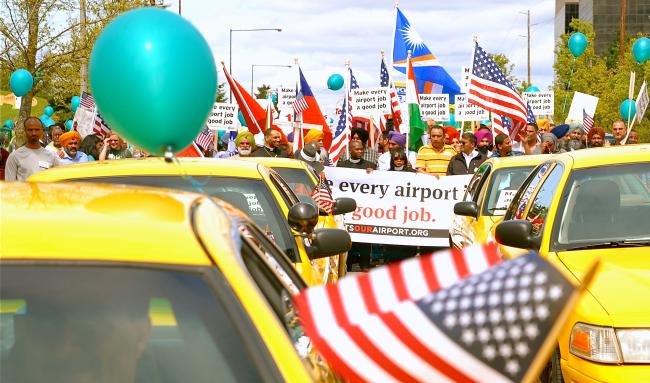Airport workers, community allies launch employment initiative in SeaTac
About 300 Sea-Tac airport workers rallied Saturday, April 28, 2012 by the airport and marched south on International Blvd. to Angle Lake Park to protest low wages and poor working conditions
Wed, 05/15/2013
Airport workers and community allies are moving forward on a voter initiative to set wages and work conditions for the jobs of thousands of low-wage workers in and around SeaTac Airport.
Last week, airport workers who are part of the SeaTac Committee for Good Jobs filed an initiative petition with the city of SeaTac and have begun to collect signatures to get the measure qualified for presentation to the City Council, and for inclusion on the November ballot.
Committee representatives need 1,541 signatures, which is 15 percent of the registered voters from the November, 2011 city elections.
More than 90 volunteers came out last Saturday to gather signatures. The committee expects to gather enough signatures to qualify to get the measure qualified for presentation to the City Council, and for inclusion on the November ballot in the coming weeks.
An array of workers, faith and community supporters, union members and retirees are part of the SeaTac Committee for Good Jobs. Working Washington is also part of the committee.
The measure would set basic employment standards for workers employed in the transportation, tourism and hospitality industries in SeaTac:
Paid sick leave, more full-time work opportunities, companies that collect automatic service charges, or collect tips on customer bills, must give 100 percent of the service charges or tips to the workers who performed the service and wages of at least $15/hour
The measure would cover businesses in and around the airport, including airport baggage handling, passenger services, cabin cleaning, aircraft fueling, security, and retail stores, along with hotels, rental car and parking lot facilities. Small businesses are specifically exempt.
Approximately 5,000 workers would be affected by the initiative.
King County Councilmember Julia Patterson, a SeaTac resident, noted, “When workers aren’t paid a living wage their ability to be self-sufficient is compromised. They are forced to choose between food, housing costs, gas for their car – the day-to-day necessities that most of us can count on. As a result, things like their health care and their ability to save for the child’s college education are secondary, or most likely, out of reach. It’s a cycle that affects not only them, but also the entire community. It impacts our schools, our neighborhood health centers, and our community’s economic vitality.”
The Rev. Jan Bolerjack noted that many low-wage airport workers currently rely on charity for basic living. “I see families of Sea-Tac workers struggling to pay rent and utility bills. Many even visit our food bank regularly. The good jobs initiative can transform poverty wages to good airport jobs for families. The resources are scarce around here but now the neighborhoods are filled with a new hope,” Rev. Bolerjack said. “There is a possibility for change. What a wonderful feeling it brings to our community.”
SeaTac resident Earl Gipson said the initiative backers are not considering the long-term consequences of the proposal.
“We didn’t think Boeing would ever leave Seattle and it did,” Gipson declared. “I predict Alaska Airlines will move out of SeaTac. No more hotels will be built.
“I hope wisdom sinks in and people realizes this goes too far.
“The unions are overreaching. The city should not be the manager of private business. This gets the city involved as a union administrator.”
State law and state Public Disclosure Commission guidelines prevent comments on ballot propositions during City Council meetings.
Instead, initiative opponents read the entire initiative during public comments at the May 14 council meeting.
Residents Gipson, Vicki Lockwood and Erin Sitterley took turns reading the initiative. Other initiative opponents sat in the audience.
If the initiative receives enough signatures, the council members will either have to adopt the proposal or submit it to SeaTac voters for approval.
Comments on the initiative would then be allowed at the council meeting prior to action by the lawmakers.
Councilmember Rick Forschler asked City Manager Todd Cutts for a report on the financial impacts to the city’s budget if the measure was approved. He noted city officials could not wait until after the November election to study the impacts on the 2014 budget.
Cutts said staff planned to wait to see if enough signatures are gathered before studying the impact.


